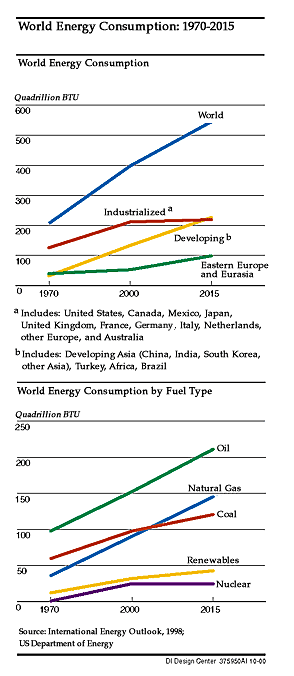
Search Sitemap Feasta website
 Oil scarcity no problem, says CIA
Oil scarcity no problem, says CIA
A report published by the US Central Intelligence Agency in December 2000 does not anticipate any problems in meeting the world's rising demand for fossil fuels over the next 15 years. The relevant section of the report touches on several issues discussed in this Review besides oil depletion. It reads:
"Sustained global economic growth, along with population increases, will drive a nearly 50 percent increase in the demand for energy over the next 15 years. Total oil demand will increase from roughly 75 million barrels per day in 2000 to more than 100 million barrels in 2015, an increase almost as large as OPEC's current production. Over the next 15 years, natural gas usage will increase more rapidly than that of any other energy source-by more than 100 percent-mainly stemming from the tripling of gas consumption in Asia.
"Asia will drive the expansion in energy demand, replacing North America as the leading energy consumption region and accounting for more than half of the world's total increase in demand.
- China, and to a lesser extent India, will see especially dramatic increases in energy consumption.
- By 2015, only one-tenth of Persian Gulf oil will be directed to Western markets; three-quarters will go to Asia.
"Fossil fuels will remain the dominant form of energy despite increasing concerns about global warming. Efficiency of solar cells will improve, genetic engineering will increase the long-term prospects for the large-scale use of ethanol, and hydrates will be used increasingly as fuels. Nuclear energy use will remain at current levels.
"Meeting the increase in demand for energy will pose neither a major supply challenge nor lead to substantial price increases in real terms. Estimates of the world's total endowment of oil have steadily increased as technological progress in extracting oil from remote sources has enabled new discoveries and more efficient production. Recent estimates indicate that 80 percent of the world's available oil still remains in the ground, as does 95 percent of the world's natural gas.
- The Persian Gulf region-absent a major war-will see large increases in oil production capacity and will rise in its overall importance to the world energy market. Other areas of the world-including Russia, coastal West Africa, and Greenland-will also increase their role in global energy markets. Russia and the Middle East account for three-quarters of known gas reserves.
- Latin America-principally Venezuela, Mexico, and Brazil-has more than 117 billion barrels of proven oil reserves and potentially 114 billion barrels of undiscovered oil, according to the US Geological Survey. With foreign participation, Latin American production could increase from 9 million barrels per day to more than 14 million.
- Caspian energy development is likely to be in high gear by 2015. New transport routes for Caspian oil and gas exports that do not transit Russia will be operating.
"Oil-producing countries will continue to exert leverage on the market to increase prices but are unlikely to achieve stable high prices. Energy prices are likely to become more unstable in the next 15 years, as periodic price hikes are followed by price collapses.
"By 2015, global energy markets will have coalesced into two quasi-hemispheric patterns. Asia's energy needs will be met either through coal from the region or from oil and gas supplies from the Persian Gulf, Central Asia, and Russia. Western Europe and the Western Hemisphere will draw on the Atlantic Basin for their energy sources at world prices."
Not surprisingly, the increased level of economic activity will have serious environmental consequences but, realistically perhaps, the CIA does not expect effective international action to be taken to counteract these.
"Contemporary environmental problems will persist and in many instances grow over the next 15 years. With increasingly intensive land use, significant degradation of arable land will continue as will the loss of tropical forests. Given the promising global economic outlook, greenhouse gas emissions will increase substantially. The depletion of tropical forests and other species-rich habitats, such as wetlands and coral reefs, will exacerbate the historically large losses of biological species now occurring. (...)
"Global warming will challenge the international community as indications of a warming climate-such as meltbacks of polar ice, sea level rise, and increasing frequency of major storms-occur. The Kyoto Protocol on Climate Change, which mandates emission-reduction targets for developed countries, is unlikely to come into force soon or without substantial modification. Even in the absence of a formal treaty, however, some incremental progress will be made in reducing the growth of greenhouse gas emissions."
Colin Campbell's comment (4th January 2001) on the CIA's report was: 'This organisation is in the business of subterfuge and deception, so we should not expect otherwise when it addresses oil supply. Its motive for exaggerating the world's oil supply is to undermine the Middle East's confidence in its ability to control world oil supply and thereby price. The US is already facing the onset of recession, partly triggered by high oil price. It is a situation that can only get worse'
The full report can be downloaded at the CIA website.
|
This panel is from the first Feasta Review, a 204-page large format book. Copies of the book are available for £9.95 from Green Books. |
 |
| Search Sitemap Feasta website |  |